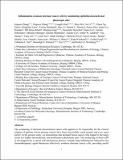Inflammation awakens dormant cancer cells by modulating the epithelial–mesenchymal phenotypic state
Author(s)
Zhang, Jingwei; Zhang, Jingwen; Han, Longfei; Wu, Shiyi; Li, Jie; Eaton, Elinor Ng; Yuan, Bingbing; Reinhardt, Ferenc; Li, Hao; Strasser, Patrick C.; Das, Sunnny; Donaher, Joana Liu; Khalil, Md Imtiaz; Jiang, Haiping; Deuschel, Alexander; Lin, Danni; Sebastiany, Carolin; Maranga, Mariana; Shubitidze, Salomé; Liu, Xiaofei; Lambert, Arthur W.; Zhang, Yun; Liu, Yana; Sui, Lufei; Elmiligy, Sarah; Pozza, Umberto; Günsay, Rauf; Mishra, Ranjan; Velarde, Jose; Iyer, Sonia; Henry, Whitney S.; Weiskopf, Kipp; Feng, Guihai; Oni, Tobiloba E.; Watnick, Randolph S.; Li, Xin; Weinberg, Robert A; ... Show more Show less
DownloadAccepted version (5.706Mb)
Open Access Policy
Open Access Policy
Creative Commons Attribution-Noncommercial-Share Alike
Terms of use
Metadata
Show full item recordAbstract
The awakening of dormant disseminated cancer cells appears to be responsible for the clinical relapses of patients whose primary tumors have been successfully cured months and even years earlier. In the present study, we demonstrate that dormant breast cancer cells lodged in the lungs reside in a highly mesenchymal, nonproliferative phenotypic state. The awakening of these cells is not triggered by a cancer cell-autonomous process. Instead, lung inflammation induced by the chemotherapeutic agent bleomycin effectively awakens dormant cancer cells, providing useful models for studying metastatic awakening. Mechanistically, the awakened cells shift from a highly mesenchymal to a quasi-mesenchymal phenotypic state in which they acquire tumorigenicity and proliferative ability. Once awakened, these cells can stably reside in this quasi-mesenchymal state and maintain their tumor-initiating ability, doing so without ongoing heterotypic signaling from the lung microenvironment. Epidermal growth factor receptor ligands released by the cells of the injured tissue microenvironment, including notably M2 type macrophages, promote dormant cancer cells to move toward this quasi-mesenchymal state, a transition that is critical for the awakening process. An understanding of the mechanisms of metastatic awakening may lead in the future to treatment strategies designed to prevent such awakening and resulting metastatic relapse.
Date issued
2025-09-03Department
Whitehead Institute for Biomedical Research; Koch Institute for Integrative Cancer Research at MIT; Massachusetts Institute of Technology. Department of Biology; Ludwig Center for Molecular Oncology (Massachusetts Institute of Technology)Journal
Proceedings of the National Academy of Sciences
Publisher
Proceedings of the National Academy of Sciences
Citation
J. Zhang,J. Zhang,L. Han,S. Wu,J. Li,E.N. Eaton,B. Yuan,F. Reinhardt,H. Li,P.C. Strasser,S. Das,J. Liu Donaher,M.I. Khalil,H. Jiang,A. Deuschel,D. Lin,C. Sebastiany,M. Maranga,S. Shubitidze,[...] & R.A. Weinberg, Inflammation awakens dormant cancer cells by modulating the epithelial–mesenchymal phenotypic state, Proc. Natl. Acad. Sci. U.S.A. 122 (36) e2515009122 (2025).
Version: Author's final manuscript